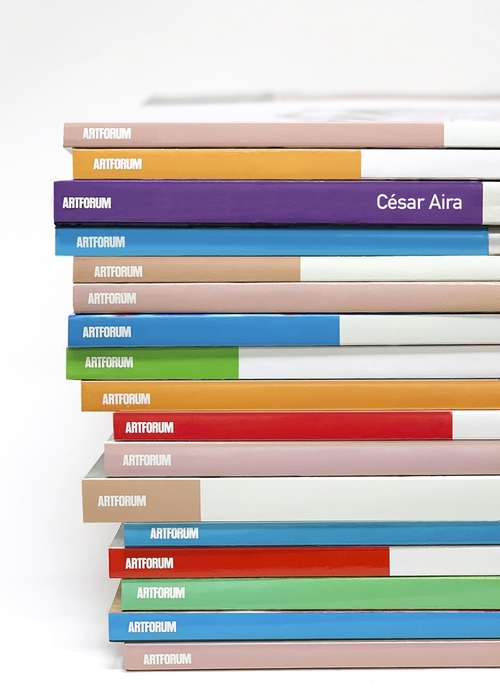
César Aira’s Artforum is a love letter to the homonymous magazine in which the author explores and exposes his obsessive relationship to the publication and his travails to find copies of it in the wild in Argentina. However, it’s much more than that. Aira is a master of language known for infusing his narratives with as much philosophy as humor, and he does that here in a brilliant series of short essays/stories/journal entries that chronicle his travails to find the magazine.
Artforum’s concept is simple. It’s made up of a collection of interrelated stories about Aira’s obsession with collecting Artforum magazine. However, his compulsion doesn’t have much to do with the art the magazine contains in its pages; for him, the magazine is a beautiful object, the result of hard work, and objet d’art worthy of attention regardless of what’s between the covers. He collects them and reads them without paying attention to when they were published. He searches for them in used bookstores. He even subscribes to it once, a move that changes the way he looks at the passage of time as everything happens while he waits for the arrival of his beloved magazine.
Just like some albums could only come from a band, this book is a tiny gem that could only have come from Aira. The writing is feverish, strange, smart, and hilarious. The prose is self-aware and hypercritical, but also accepting and willing to share things the narrator knows will put him in a less-than-ideal light. All obsessions are bad when pushed to the extreme, and Aira knows that:
Underneath an innocent hobby, a picturesque eccentricity, there gaped something nameless (the meaning of a sign that had occupied my thoughts forever), which could just as well be lethal as the key to a new life.
Two elements in Artforum jump to the forefront and quickly push this tiny book into the realm of the must-reads. The first is the writing itself, the superb turns of phrase that have made Aira a household name and which make his writing so interesting and engaging even when he’s writing about…well, an obsession with an art magazine. Take, for example, this line, which I haven’t been able to forget since I read it a week ago: “Material made of spirit is the luxurious border where reality communicates with utopia.” A magazine made of spirit. Reality approaching utopia thanks to a few glossy pages full of art and words. Impossible? Not here.
The second element that makes this book worthy of attention is the beautiful way in Aira frames the Artforum fixation. Simultaneously worried, critical, accepting, and questioning, Aira is aware of how an object can transcend and become something else; he knows how animism can push things out of the realm of things and into a territory occupied by things aren’t human while also not being things:
Can an object love a man? The entire history of animism was contained in that question. But anthropologists who had tried to answer it had never had the opportunity, as I had, to pose it while face-to-face with an object that had offered the supreme proof of love. It was not as impossible as it seemed at first sight. Objects were carriers of information. All of them, from cathedrals to little balls of mercury, were inscribed with their histories, their properties, their user manuals. That they did this in a mute, sometimes enigmatic, language did not detract from the eloquence. You had only to decipher them. Objects called books (and more so, magazines) twice over carried out their condition as objects by being specialized carriers of information; they were super-objects, because in their infinite variety and novelty they could supplant of the other objects in imagination and desire.
This little book, which comes in at 80 pages, showcases a master at work while delivering a quirky, unique reading experience that will make readers chuckle in one paragraph and marvel at Aira’s talent the next. Also, the translation, done by Katherine Silver, show that, when in good hands, works in translation can retain the beauty and spark of the author’s native voice.
***
Artforum
by César Aira; translated by Katherine Silver
New Directions; 80 p.
Follow Vol. 1 Brooklyn on Twitter, Facebook, and sign up for our mailing list.
